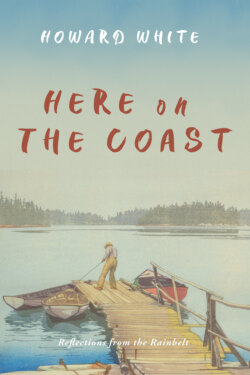Читать книгу Here on the Coast - Howard White - Страница 18
На сайте Литреса книга снята с продажи.
ОглавлениеTalking Hard Times
Dr. Nouriel Roubini, a.k.a. “Dr. Doom,” the economist who predicted the 2008 financial crisis and the coronavirus financial crisis (though not coronavirus itself), is still steadfastly predicting harder times ahead. Some might point out even a broken clock is right twice a day, but I think I might be genetically susceptible to such predictions because I find them impossible to ignore.
Even if you want to face this kind of scary music, though, what do you do? The portfolio managers of course will keep up their chorus of “Don’t panic. Stay the course. Have faith in value. Over the long haul, we’ll all make our 10 per cent.” Well, a company called MacMillan Bloedel was once considered the epitome of value. It was the colossus of BC industries with huge pulp mills at Nanaimo, Port Alberni and Powell River. Whatever happened to it, anyway? Now Harmac is being operated by staff, Powell River is limping along on one cylinder and they seem to change the name over the mill gate every few months. What the hell kind of a name is Catalyst, anyway? It sounds more like a pyramid vitamin scheme than a respectable forest products company. Westinghouse was once considered an unassailable bastion of value. So were the Alberta oil sands.
My late father used to rub his hands with glee when he heard Dr. Roubini’s kind of talk. “I think people are in for a big surprise,” he’d chortle. “All the signs remind me of 1929. Runaway speculation on Wall Street. Everybody playing the stock market. Plants shutting. The president telling us we’ve never had it so good, despite more poverty and homelessness than ever. Do you know Herbert Hoover and R.B. Bennett kept saying that right through the darkest days of the Depression? Oh yes, I can feel it in the air. This one is going to make the dirty thirties look like a picnic. I’m glad I won’t be around.”
The good news is that my poppa had been sensing this air of impending financial doom to varying degrees for as long as I can remember, going back to the late 1940s. Once he had me so worried I actually converted my life savings into three tiny gold bars, which promptly lost 50 per cent in value. I wonder if they’re still under that loose brick in the fireplace? Sooner or later I guess he’ll be proven right, but in the meantime he spent his adult life missing out on the greatest growth cycle in the history of the world. I used to point out to him that if he’d put that $1,500 into the Lougheed property instead of a rusty backhoe back in 1956, he could have sat on his butt and made more money than he did working like a fiend for the following four decades. Not only would he have been able to live in luxury for the rest of his days, so would I.
What intrigues me is the notion that there ought to be something you could invest in that would have good value now, and wouldn’t lose it if things do get as tough as the pessimists predict. A good little farm, maybe. Buy the land, get some keen young organic couple to run it, sell the produce locally, watch the value grow as food scarcities increase. No matter what happens, you’ve still got a chunk of property, and you can always feed yourself. Keeping to the food theme but being more coast-appropriate, a shellfish farm might do the trick. Or if you couldn’t afford that, how about starting a small herd of omega-3 pigs? The only fly in this oinkment is every farmer I know, wet or dry, wants to bail out to escape the hard work and thin margins.
A woodlot, perchance? Trees grow with very little outside help. But wood is one of those commodities that doesn’t fare well in recessions. And it’s tough eating. How about some kind of low-tech survival gear that would be in demand if broad supply networks broke down? Wind mills? Pelton wheels? Hand tools? Another of my dad’s strategies dating back to his gyppo logger days was to lay in a good supply of junk. Old truck wheels, chunks of rusty pipe, bed frames, washing machine motors, Model T axles, gearboxes, every kind of engine part. His back yard was a popular stopping place for the area’s handymen even in good times, and would have been a gold mine if Canadian Tire ever shut down. Too bad he gave in to neighbourhood outrage and dunged it out.
I am aware this list of depression-proof investment strategies is less than compelling, but I still think the idea has promise. Watch for some trendspotter like Malcolm Gladwell to come out with a bestseller on the subject, thereby securing his own economic future.
My friend Jerry had another approach to making sure he would get full value from his stash that was guaranteed to work. His plan was to move into as nice a condo as he could find, go on as many cruises, take as many plane trips to exotic climes and indulge in as many enjoyable habits as he could while he still could. If I brought up the prospect of an unprovided-for future he’d say, “At least I’ll have a great bunch of memories in the bank, which is more than you’ll have.” He tottered into his grave a couple years back with an empty bank account and a big smile on his face. Much as I envied him, I can’t bring myself to follow his example. Like most, I will probably go on doing exactly as the financial advisers and authority figures advise. And that’s probably a good thing.
